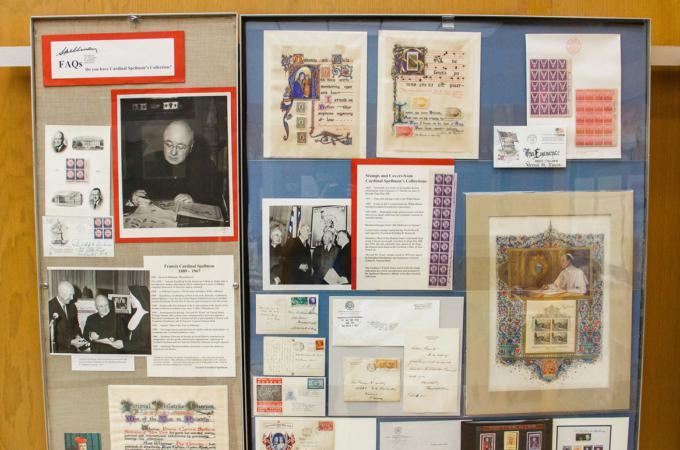Spellman Museum links history with stamps
WESTON -- Despite the obvious appeal Spellman Museum of Stamps and Postal History, located on the campus of Regis College in Weston, might have to stamp collectors, with its estimated assortment of around two million stamps and its collection evaluation service, it's mostly non-collectors who visit the museum.
"You don't have to be a stamp collector to enjoy the Spellman (Museum)." said Henry Lukas, the museum's education director.
"We're a stamp museum, but we consider ourselves a history museum, we consider ourselves an art museum. You name a topic, and we can pretty much find a stamp that relates to that topic," he said.
For example, Lukas said, to prepare for the 2016 Summer Olympics in Brazil, the museum currently has an exhibit featuring a number of historical stamps, pins, postcards, and other items that highlight the significance of past Olympic games, such as the 1936 Olympics held in Nazi Germany.
To help kick the exhibit off, the museum held a free day, July 15, that featured arts and crafts, scavenger hunts, and even a visit from several former Olympians.
Lukas said children, in particular, seem to enjoy these events and their trips to the museum.
"The first thing every child does when they comes to museum -- they have to send themselves a postcard," Lukas said.
He noted that doing so not only teaches them how to use stamps and fill out a postcard, but it also serves as a reminder to them that they were there when they get it a few days later in the mail.
Children also receive a free book of stamps before leaving, so they can begin to "think about collecting stamps," Lukas said.
The exhibits in the museum rotate every several months, drawing from about two million stamps the museum staff estimates it has in storage, all of which were obtained through donations, which Lukas said are received frequently.
In its collection lies stamp donations from a number of high profile figures, including President Dwight D. Eisenhower and Cardinal Francis J. Spellman, whose collection helped found the museum and whose name the museum bears.
Cardinal Spellman, a Massachusetts native and a former auxiliary bishop of Boston and one time Archbishop of New York, was a "collector at heart" who began collecting stamps back when he was in the seminary in Rome, said Lukas, obtaining stamps from the many places he traveled and the many events he attended.
Over the years, his collection grew, leading the cardinal to give it to the Sisters of St. Joseph in Boston for safekeeping. Sister Fidelma Conway, CSJ, organized the collection, and 12 years later, in 1960, used it to found the Cardinal Spellman Philatelic Museum on the campus of Regis College.
The museum opened publically in 1963 on May 4, Cardinal Spellman's birthday, during a ceremony attended by over 1,000 people.
A sentiment written in 1950 by the cardinal continues to act as an idea for the museum to operate by: "Stamps are miniature documents of human history. They are the means by which a country gives sensible expression to its hopes and needs; its beliefs and ideals."
During the summer, the Spellman Museum of Stamps and Postal History is open from noon to five on Thursdays, Fridays, and Saturdays. For more information, visit www.spellmanmuseum.org.



















